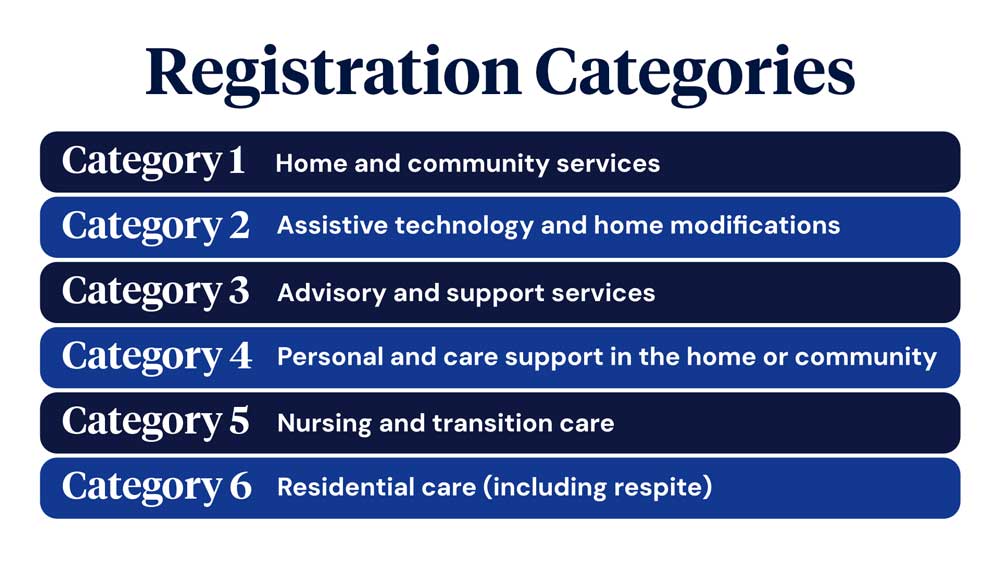The new Aged Care Act came into effect on 1 November 2025, replacing the existing Aged Care Act 1997, Aged Care (Transitional Provisions) Act 1997 and Aged Care Quality and Safety Commission Act 2018 (DoHDaA 2025).
What does this new legislation mean for you as an aged care worker, and what do you need to know?
What is the New Aged Care Act?
The new Aged Care Act was developed in response to the final report of the Royal Commission into Aged Care Quality and Safety, which found that the existing Aged Care Act was ‘no longer fit for purpose’ and recommended that a new, rights-based Act be established (DoHDaA 2025a, b).
The new Act, which responds to 58 recommendations made by the Royal Commission, was introduced in September 2024 and passed by Parliament in November 2024 (DoHDaA 2025b).
Unlike the Aged Care Act 1997, which mostly related to funding models and providers, the primary aim of the new Aged Care Act is to empower older people and ensure their rights, needs and preferences are at the forefront of aged care services (My Seniors World 2025; ACQSC 2025a).
Overall, the new Aged Care Act seeks to establish a stronger, more responsive aged care system that prioritises older people’s rights, dignity and needs (ACQSC 2025a).
The new Act aims to:
- Empower older people who are receiving aged care services and improve their lives
- Uphold older people’s rights
- Help older people live active, self-determined, meaningful lives
- Ensure older people have equitable access to funded aged care services
- Assist older people to participate in society
- Support older people to exercise choice and control over the aged care services they receive
- Establish a robust, risk-based regulatory framework for aged care services, which includes accessible systems for making complaints
- Protect older people from harm, mistreatment, neglect and poor or unsafe care
- Support older people to understand their rights, access advocacy services and provide feedback
- Support aged care providers and workers to deliver high-quality aged care services.
(ACQSC 2025a)
Key Elements of the New Aged Care Act
Some of the key components of the new Aged Care Act include:
The Statement of Rights
A Statement of Rights is embedded in the new Act to ensure that older people are at the centre of their care. This replaces the previous Charter of Aged Care Rights (DoHDaA 2025c).
The Statement of Rights includes six areas of focus for the rights of older people receiving aged care services:
- Independence, autonomy, empowerment and freedom of choice
- Equitable access
- Quality and safe funded aged care services
- Respect for privacy and information
- Person-centred communication and ability to raise issues without reprisal
- Advocates, significant persons and social connections.
(ACQSC 2025b)
For more information on the Statement of Rights, see Ausmed’s Training Module on Person-Centred, Rights-Based Care for the Older Person
The Strengthened Aged Care Standards
The findings of the Royal Commission in 2021 included several recommendations to review the existing Aged Care Standards. As a result, seven new strengthened Aged Care Standards were developed and came into effect alongside the Act on 1 November 2025. The new standards are:
- The Individual
- The Organisation
- The Care and Services
- The Environment
- Clinical Care
- Food and Nutrition
- The Residential Community.
(DoHDaA 2025d)
For more information, see Ausmed’s Training Module on the Strengthened Aged Care Quality Standards
Pathways for Upholding Rights
There are several pathways that can be taken to help uphold the rights of older people.
Complaints processes will be the primary method for older people to raise concerns about their rights.
- Care recipients and/or those connected to them will be encouraged to voice concerns directly to their provider. All providers will be required to establish and follow a complaints management system and process.
- If the provider fails to resolve the issue quickly and fairly, older people and their supporters can escalate their concern to the Aged Care Quality and Safety Commission without fear of retribution via new whistleblower protections.
Enforcement pathways
The ACQSC will work alongside providers to reduce risks and improve performance. This could involve extra monitoring of the provider or directing a provider to take action to address issues.
The ACQSC can respond to issues and take additional action against a provider in proportion to misconduct, for example:
- Ordering providers to take certain actions (at their own expense)
- Issuing fines for providers or individual workers
- Imposing civil penalties.
(DoHDaA 2025a)
Supported Decision-Making
The new Act enables older people to designate trusted individuals as ‘registered supporters’ to assist them with making decisions about their care. The responsibilities of registered supporters are defined in the Act (CareMaster 2025; OPAN 2025).
What is a registered supporter?
A registered supporter is someone chosen by an older person to help them make and communicate decisions. In some cases, a registered supporter might also be the older person’s guardian, enduring power of attorney or other appointed decision-maker (DoHDaA 2025f).
Who can be a registered supporter?
A registered supporter can be a family member, friend or someone else the older person trusts (DoHDaA 2025f).
How is a registered supporter appointed?
After 1 November 2025, registered supporters can be appointed by contacting My Aged Care, an aged care assessor or an Aged Care Specialist Officer, or via an online or printed Registration of a Supporter form (DoHDaA 2025g).
Registered supporters will replace the existing roles of ‘regular representatives’ and ‘authorised representatives’. From 1 November 2025, regular representatives and authorised representatives will automatically become registered supporters in the My Aged Care portal. These relationships can be opted out of at any time (DoHDaA 2025f, g).
Increased Whistleblower Protections
The new Act increases existing protections for whistleblowers, enabling older people, their loved ones and aged care workers to make disclosures about organisations or individuals who have not followed aged care law without fear of reprisal. The Act also protects whistleblowers' identities with some exceptions) (DoHDaA 2025c).
New Regulatory Model
The Act sets out a new regulatory framework for how the aged care sector will operate, including changes to:
- Processes for aged care providers to enter, stay or exit the sector
- Obligations and reporting requirements for providers
- Regulatory oversight
- Complaints and feedback processes
- How information is provided to older people.
(DoHDaA 2025e)
This new framework also supports the strengthened Standards and the new Support at Home Program (DoHDaA 2025e).
New Provider Registration Model
Under the new regulatory model, providers will now only need to register once, even if they provide several programs (e.g. residential aged care and home care). There are six registration categories, and a provider may need to be registered under several of these to cover all of the services they offer. The six categories are:

(Adapted from DoHDaA 2025h)
Financial and Prudential Standards
The Act introduces new Financial and Prudential Standards that outline the minimum requirements of good financial and prudential management for registered, government-funded aged care providers.
The existing four Standards (Liquidity, Governance, Records and Disclosure) will now be replaced by the following three Standards:
- Financial and Prudential Management Standard
- Liquidity Standard
- Investment Standard.
(ACQSC 2025c)
What’s Ahead?
A new screening process for aged care workers will commence in mid-2026. This new screening process is intended to align with the National Disability Insurance Scheme (NDIS) worker screening check.
Until then, aged care workers are required to have either:
- A police certificate from within the previous three years that doesn’t contain certain offences, or
- An NDIS worker screening check.
(DoHDaA 2025i)
Responsibilities for Aged Care Workers
Now that you have an understanding of what the new Act involves, what does it actually mean for you as an aged care worker?
The following are key changes that will directly affect how you provide care and services:
- You will have expanded whistleblower protections
- You will need to be aware of the Statement of Rights and what older people will expect from you, including that you have the right qualifications, skills and experience to perform your role
- You should be aware that older people can appoint a registered supporter to help them make and communicate decisions
- You will need to understand the strengthened Aged Care Standards and what they involve
- Under the Statement of Principles, the aged care system is required to support you by:
- Enabling you to facilitate continuous improvement and innovation
- Allow you to participate in governance and accountability processes
- You still need to comply with the Code of Conduct for Aged Care
- You will need to meet updated worker screening requirements to ensure you can appropriately perform your role.
(ACQSC 2025a)
Test Your Knowledge
Question 1 of 5
What are the seven strengthened Aged Care Standards coming into effect with the new Act?
Topics
Further your knowledge
References
- Aged Care Quality and Safety Commission 2025a, About the New Aged Care Act and Key Changes for Aged Care Workers, Australian Government, viewed 19 May 2025, https://www.agedcarequality.gov.au/workers/reform-changes-workers/about-new-aged-care-act-and-key-changes-aged-care-workers
- Aged Care Quality and Safety Commission 2025b, Statement of Rights, Australian Government, viewed 19 May 2025, https://www.agedcarequality.gov.au/workers/reform-changes-workers/statement-rights
- Aged Care Quality and Safety Commission 2025c, New Financial and Prudential Standards, Australian Government, viewed 16 September 2025, https://www.agedcarequality.gov.au/providers/financial-prudential-standards/new-financial-and-prudential-standards
- CareMaster 2025, Understanding the Aged Care Act 2024: Key Changes and Implications, CareMaster, viewed 19 May 2025, https://caremaster.com.au/understanding-the-aged-care-act-2024-key-changes-and-implications/
- Department of Health, Disability and Ageing 2025a, About the New Rights-Based Aged Care Act, Australian Government, viewed 19 May 2025, https://www.health.gov.au/our-work/aged-care-act/about
- Department of Health, Disability and Ageing 2025b, About the Aged Care Act 2024, Australian Government, viewed 19 May 2025, https://www.health.gov.au/sites/default/files/2025-01/about-the-aged-care-act-2024-plain-language-fact-sheet.pdf
- Department of Health, Disability and Ageing 2025c, A New Rights-Based Aged Care Act, Australian Government, viewed 19 May 2025, https://www.health.gov.au/resources/publications/a-new-aged-care-act-for-the-rights-of-older-people
- Department of Health, Disability and Ageing 2025d, About the Strengthened Aged Care Quality Standards, Australian Government, viewed 19 May 2025, https://www.health.gov.au/our-work/strengthening-aged-care-quality-standards/about
- Department of Health, Disability and Ageing 2025e, About the New Aged Care Regulatory Model, Australian Government, viewed 19 May 2025, https://www.health.gov.au/our-work/new-model-for-regulating-aged-care/about
- Department of Health, Disability and Ageing 2025f, Registered Supporters in Aged Care, Australian Government, viewed 15 September 2025, https://www.health.gov.au/our-work/aged-care-act/about/registered-supporters-in-aged-care
- Department of Health, Disability and Ageing 2025g, A New Registered Supporter Role for Aged Care: Arrangements for the Transition to the New Aged Care Act 2024, Australian Government, viewed 15 September 2025, https://www.health.gov.au/resources/publications/a-new-registered-supporter-role-for-aged-care-arrangements-for-the-transition-to-the-new-aged-care-act-2024?language=en
- Department of Health, Disability and Ageing 2025h, How the New Aged Care Regulatory Model Will Work, Australian Government, viewed 16 September 2025, https://www.health.gov.au/our-work/new-model-for-regulating-aged-care/how-it-works
- Department of Health, Disability and Ageing 2025i, Screening Requirements for the Aged Care Workforce, Australian Government, viewed 16 September 2025, https://www.health.gov.au/topics/aged-care-workforce/screening-requirements
- My Seniors World 2025, Aged Care Act 2025: 5 Major Shifts Every Australian Family Needs to Know Now, My Seniors World, viewed 19 May 2025, https://myseniorsworld.org/aged-care-act-2025-5-major-shifts-every-australian-family-needs-to-know-now
- Older Persons Advocacy Network 2025, New Rights-Based Aged Care Act, OPAN, viewed 19 May 2025, https://opan.org.au/new-aged-care-act/
 New
New 

